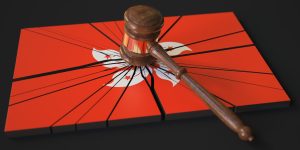On the penultimate day of 2022, the Chinese Communist Party regime drove a dagger through the heart of Hong Kong’s legal system, shredding whatever was left of judicial independence. The Standing Committee of China’s National People’s Congress (NPC) in Beijing issued an interpretation of Hong Kong’s National Security Law that hands the city’s chief executive the power to overturn court decisions and ban foreign lawyers.
The Standing Committee ruled that articles 14 and 47 of the National Security Law permit Hong Kong’s chief executive to decide which lawyers are permitted to represent defendants. The National Security Committee is empowered to overrule judicial decisions. The chief executive also has the power to appoint the judges for trials.
So, in a scenario reminiscent of the trial scene in “Alice in Wonderland,” in which the Queen of Hearts declares “sentence first, verdict afterwards,” in Hong Kong courts the judge, defense lawyer, and judgment are now predetermined – and if a court provides a decision the government dislikes, it can be overturned.
It makes a mockery of the “rule of law” principle, which has been at the heart of Hong Kong’s success as an international trading center hitherto, and of which Hong Kong had rightly been so proud. When combined with extensive reports of threats and intimidation of Hong Kong lawyers, leading to an exodus of legal minds from the city, it adds yet another nail in Hong Kong’s coffin.
It is clear that this interpretation by Beijing – sought by Hong Kong’s current Chief Executive John Lee – is aimed specifically at one individual: 75-year-old pro-democracy entrepreneur Jimmy Lai. Lai, the founder of the Apple Daily newspaper, which was forced by the regime to close in June 2021, faces trial under the National Security Law. His court case should have opened last month but has been postponed until September next year due to a legal wrangle with the Hong Kong government over whether a British barrister, Tim Owen, KC, could represent him.
Lai has already spent two years in prison, served a 20-month sentence on charges of unlawful assembly for his participation in peaceful protests, and was sentenced on December 10, Human Rights Day, to five years and nine months on trumped up fraud charges.
Even though Hong Kong’s court of final appeal upheld the decision to allow Owen to represent Lai, the Hong Kong government denied an extension to Owen’s work visa, forcing him to leave the city while it sought Beijing’s intervention. It was an act of pure vindictiveness – denying Lai even the most basic dignity of being allowed to choose his own lawyer.
But although the decision was clearly aimed at Lai, it has far-reaching ramifications for Hong Kong’s legal system. The principles of a fair trial, innocence before being proven guilty, an independent judiciary, and the right to legal defense have been torn up. Hong Kong’s legal system, just like its political system, is on a fast track to becoming part of mainland China, directly controlled by the Chinese Communist Party, which believes in “rule by law” rather than “rule of law.”
The international community cannot allow this to occur without a response and consequences. Beijing has ripped to shreds the Sino-British Joint Declaration; it must not be allowed to do so with impunity.
The first response must be for the remaining non-permanent foreign judges in Hong Kong to resign.
In March last year, the United Kingdom’s serving judges withdrew. But several retired British judges, namely Lord Hoffman, Lord Neuberger, Lord Walker, Lord Collins, Lord Phillips and Lord Sumption, along with Australia’s Justice Anthony Gleeson, Justice William Gummow, and Justice Robert French and Canada’s Justice Beverley McLachlin continue to sit in Hong Kong.
To have a situation whereby distinguished foreign judges continue to sit in Hong Kong cases while foreign lawyers may be barred from representing defendants is absurd. Those remaining foreign judges should now collectively withdraw from Hong Kong. They cannot continue to legitimize a system that has lost all legitimacy. Their own integrity is now on the line.
In addition to the foreign judges withdrawing, tough, targeted sanctions should be introduced. Until now, only the United States has imposed sanctions on officials in Beijing and their stooges in Hong Kong responsible for dismantling Hong Kong’s freedoms and autonomy. The time has come – indeed, it is long overdue – for the United Kingdom to impose similar sanctions. Members of Hong Kong’s National Security Committee, Hong Kong’s Chief Executive John Lee, and other senior figures – including Justice Secretary Paul Lam and Security Secretary Chris Tang – should now be sanctioned for destroying Hong Kong’s legal system.
And third, countries that still have extradition agreements with Hong Kong should suspend them without delay. That includes European Union member states Czechia and Portugal. How can a democracy extradite anyone to a place that no longer guarantees the right to choose your own defense counsel?
Over the past several years, and especially since the imposition of the National Security Law on Hong Kong by Beijing in 2020, Hong Kong’s freedoms, autonomy, human rights, and rule of law have been dismantled with shocking and dramatic speed. This latest ruling from Beijing furthers the rapid transformation of Hong Kong from one of Asia’s most open cities, marketed as “Asia’s World City,” into one of Asia’s most Orwellian police states.
Until now the international community has largely wrung its hands. Now it is time to act. Punitive measures may not cause Beijing to change course immediately, but they would at least send a clear message that there are consequences. If Beijing thinks that it can continue it repression with impunity, it will simply be further emboldened – and that would bring dire, potentially catastrophic, consequences for the free world.































